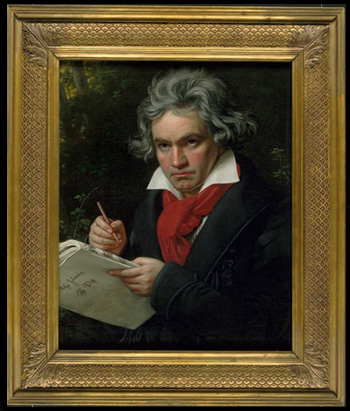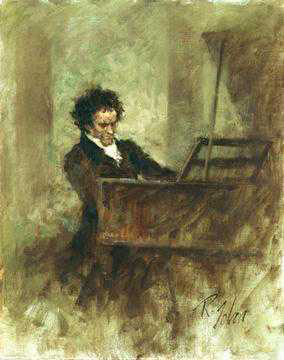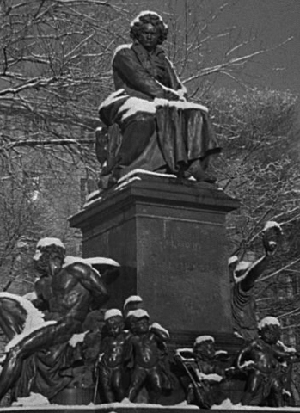Beethoven, Ludwig Van (1770-1827)
______________________________________________________

The Giant among Giants.
__________________________________________
The Germanic lands of northern Europe long have been a fertile area from which a great host of the Worlds creative genius have been nurtured. During the 18th Century, the development of Classical music was in full swing, and a new breed of Musicians were being born into a world full of political turmoil, intellectual pursuit, and romantic ideals.
The city of Bonn, Germany has a rich, cultured history, stemming back to the Roman Conquests, when the Roman Fortress 'Bonna' was torn down and the Christian community of Bonn was founded; around the year 69 of the Common Era. Far later, in the 18th century and during the Enlightenment period, we find the peaceful city of Bonn in full Bloom. The Elector of Bonn, Maximilion Friedrich ,"the philosopher of the Enlightenment", was dedicated to creativity and art, and cultivated a cultured people who lived under his protection and authority. It is in the bosom of this fertile soil, situated upon the banks of the Rhine river, that one of the greatest Musicians the World has ever been graced with was born and raised.
The family name of Beethoven was known throughout the area as court Musicians. Ludwig van Beethoven was Court Kappelmeister and a distinguished gentleman of Bonn Society, while his son, Johann, was remarkably less distinguished in his place as Court Tenor, a role he was barely capable of fulfilling. A slovenly, unkept wretch who lived in the shadow of his fathers success, Johann van Beethoven was well known for his penchant towards drinking, and his careless spending habits. Young Johann married early in life, to his fathers disapproval, to the Daughter of an Elector's cook.
Johann and his wife had six children over the years, of which only 3 survived. The first they named after Johann's father, Ludwig van... , he lived for only 6 days before succumbing to death. Undaunted, they named their second child Ludwig van Beethoven as well, and thus was born one of the mighty masters of Classical music.
Early life for young Ludwig was a harsh and unyeilding lesson, interspersed with opportunities and inspirations. From the start Johann drilled his children in music, though he was a strict and lackluster teacher. Of the three, only Ludwig showed true promise, learning his lessons so well and instinctively that Johann immediately drew ideas of creating another Mozart, the child prodigy who not so many years past had charmed the courts of Europe with his virtuosic skill and technique. Johann was unrelenting in his demanding schedule of hour after hour of scales and drills, to the point of driving young Ludwig to tears at the piano.

Alas, Johann's dreams of fame and fortune at the expense of his child were unfulfilled, as an unsuccessful tour of Europe failed to convince the nobility of Ludwig's exceptional talent. Life at home in Bonn proved to be full of opportunity for young Beethoven though, and he soon proved his talent to many in the court, so much so that he was allowed to fill in for many of the cities church organists at service by the time he was ten years old. These experiences, as well as access to many of the cities intellectual and musical elite gave Ludwig a fertile breadth of knowledge to glean and grow from.
Beethoven grew up well educated by many respected musicians and composers, and yearned to journey abroad to display his growing talents amidst what was then the cultural heart of Europe... Vienna. Plans were made and connections fostered for what Ludwig believed would be his major foray into stardom and fame amongst his peers and the audiences who would adore him. Alas, his trip was cut to but a few short weeks, for no sooned had he arrived, than his father had sent urgent word for him to return home, as his mother was deathly ill. It was a devastating blow for Beethoven, as his mother was his gentle heart amidst his father's harshness and drunken furies.
Undaunted, some years later a more mature Beethoven travelled back to Vienna to pursue his fate and fortune. Helped along by his benefactor, Maximilion Freidrich, the Elector of Bonn, Ludwig was brought before refined Veinnesse society an uncouth, shabbily dressed outsider who nonetheless had a burning passion and emotional nature which impressed those he came in contact with.
During his first trip to Vienna, Ludwig had the wonderful opportunity to play before Herr Mozart, who was at first unimpressed with Beethovens talent. Inspired, and eager to impress the master, Ludwig pleaded with Mozart to give him a theme upon with Beethoven could improvise, and then proceeded to embellish and improvise upon that theme with such skill and virtuosity, that Mozart himself remarked to his friends close by that they ' should keep an eye on him, for one day he will make such a sound that the whole world will take notice'.

Indeed, Vienna did stand up and take notice of the growing talent and unbridled emotional maelstrom which was the wizardry of Beethovens compositional sorcery. The old school, staunch, classically minded reviewers were loath to give credit to the fiery dissonance of beethoven's music, which was unconventional and strained the ears of the audience as well as the skills of those who had to attempt what was widely considered unplayable music by the musicians of the day. Meanwhile, Beethovens music was heralded by the intellectual romantics and youthful composers who surrounded him as an emotional zeitgiest, and success was not to be found far behind, in fact Beethoven himself remarked that he could pick his publisher from the multitudes who knocked at his door every time he finished a composition. This had the unfortunate side effect of creating many legal and monetary woes for Beethoven over the years though, as publishers would illegally sell his work and undermine each other as well as the composer for profit and gain.
Alongside Beethovens growing fame was exposure and
acceptance amongst Vienna's nobility and social elite. Ever a passionate
and fiery spirit, Beethovens nature demanded respect for his creative
genius even as he frowned upon the pomposity of those who considered themselves
elite based upon their bloodlines. At one point he even furiously blacked
out the name 'Bonaparte' from what was to be a tributary symphony to the
French Conquerer when Ludwig found out that Napoleon had declared himself
Emperor. The symphony was instead renamed the Eroica, 'In memory of a
great man'.
Entering into middle age, Beethoven began to have ringing sensations and
intermittant problems hearing conversations. This was a startling and
devastating blow to the master composer, and rather than confide in friends
and family as to his growing deafness, Beethoven chose to flee into self
imposed seclusion. For many years only his personal physicians had any
real clue as to his disability, and even though with todays medicine the
fungus which had attacked beethovens inner ear could have been easily
combatted and destroyed, during that period his doctors had no solution
for such an infection.
Beethoven fled into the countryside at the suggestion of his doctors in order to give relief to his ears from the noise pollution of the city, and while the seclusion gave some temperary relief, the respite was not long lived, and beethovens deafness grew worse, until hearing even his own piano playing became almost impossible, to the point where he would have to place his head upon the piano in order to feel the vibrations of the instrument.
Such was the strength of will and visionary spirit of Ludwig van Beethoven, that even deafness could not stop the flow of music through him, and he composed many of his greatest works from within the confines of his own mind, unable to fully appreciate the beauty and majesty of his own creations, he entrusted his talent and abilities to conjure forth the music which only others would be able to hear. Finally, in the fall of 1826, after recovering from a lung infection contracted while travelling, Beethovens health became worse until finally, in the early spring, Lugwig van Beethoven set his worldly affairs in order, and passed away on the afternoon of March 26th, 1827 in the midst of a spring thunderstorm.

Le' rue Delashay...Not like Most Magazine, Issue #15.